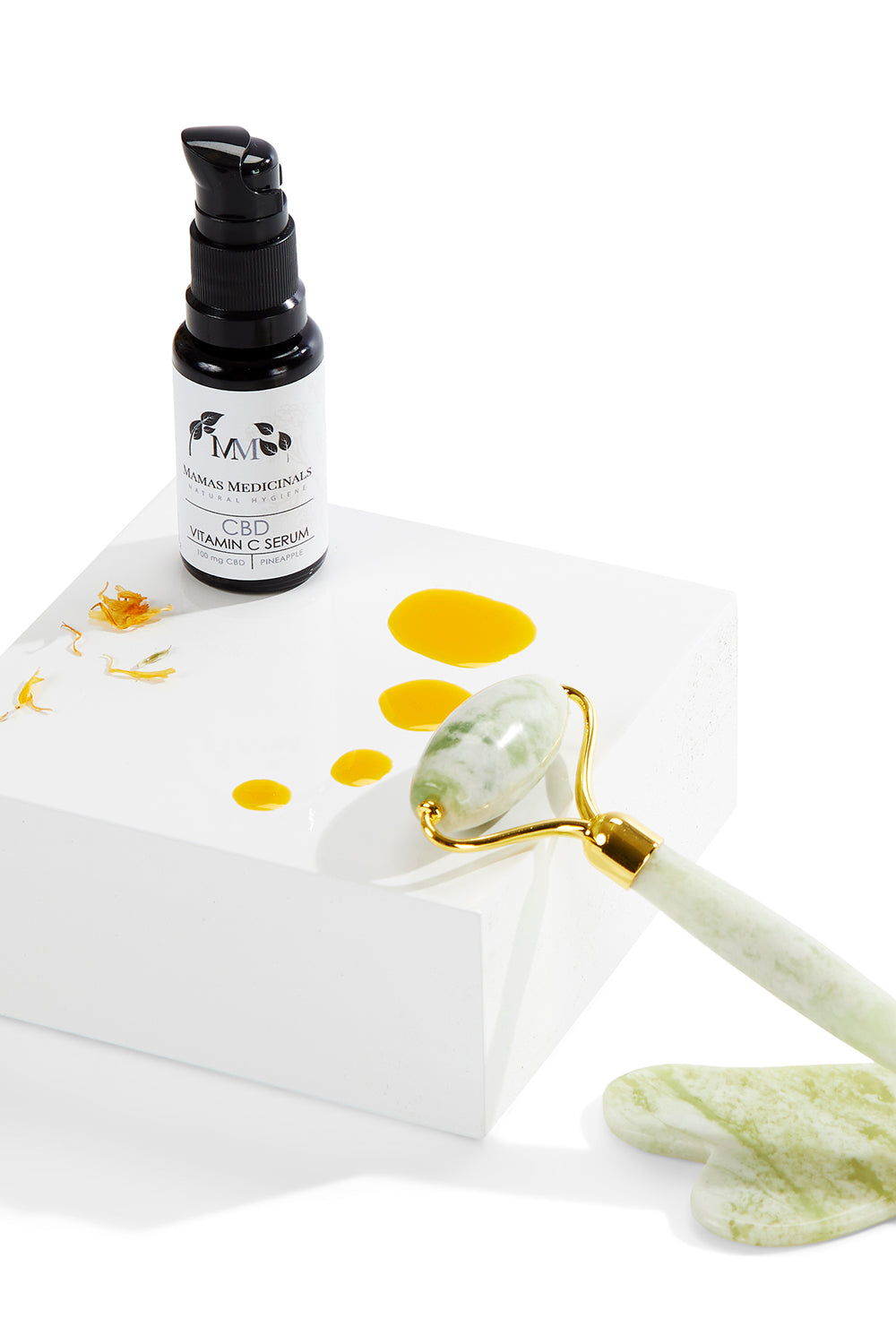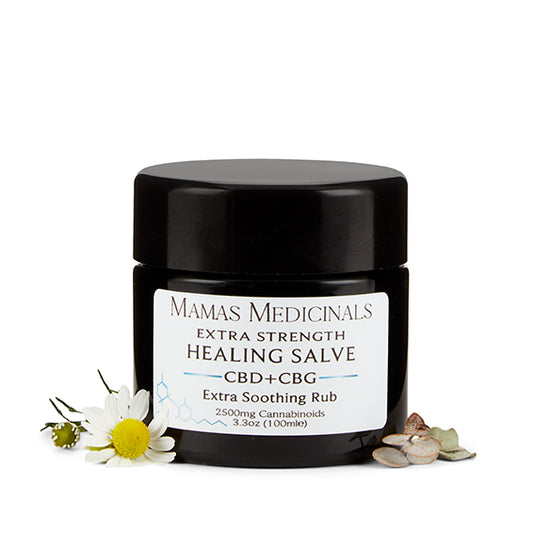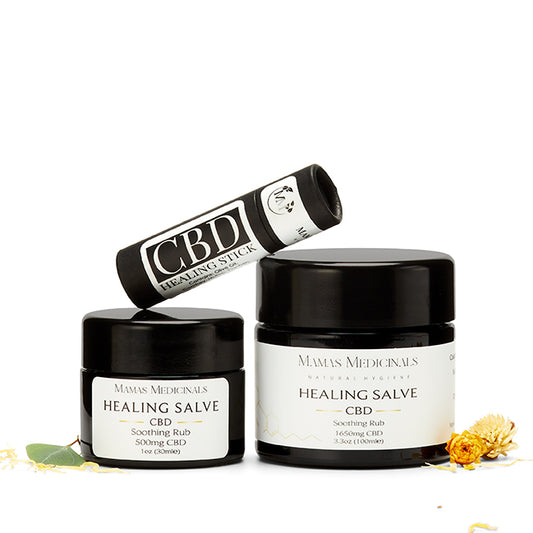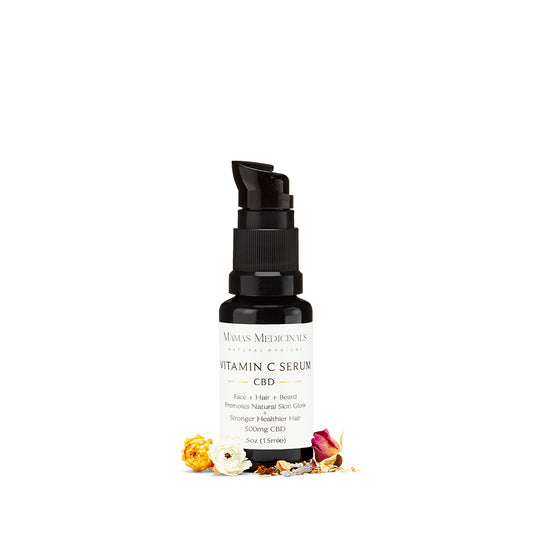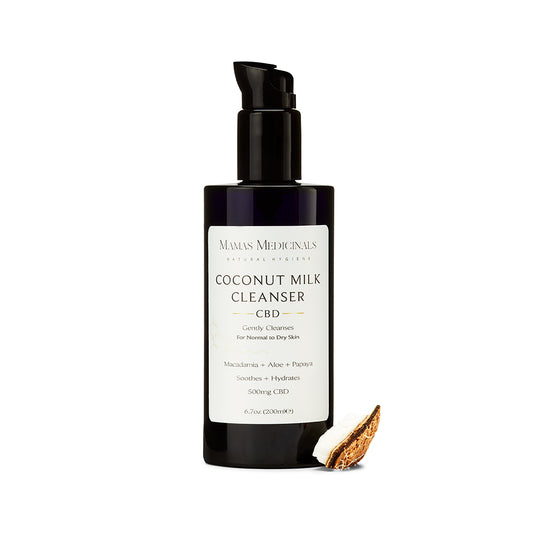What's the deal with peptides?
Did you know our bodies make peptides? As we grow older, our bodily peptides naturally decline, so applying peptides topically can provide the skin with essential amino acids to build the proteins needed to protect the skin barrier and age gracefully.
Peptides have been around longer than humans but peptides in skincare have become more popular in the last few years for their anti-aging effects on the skin, or should I say pro-aging!
You’ll find synthetic peptides in most skincare which is why more and more people are looking for a natural peptide skincare solution. In this article, we delve into the realm of peptides for skin, providing you with a comprehensive understanding of their benefits.
But, what are peptides?
Think of peptides as these little chains of amino acids. They're like the Lego bricks that build important proteins such as collagen, keratin, and elastin. And these proteins are like the superheroes that keep your skin looking and feeling great.
Let's look at 4 types of peptides
- Neurotransmitter Peptides:These can be found in treatments like Botox and products like Argireline. They tell your facial muscles to chill out, reducing the number of wrinkles and those lines that show your emotions. A study from 2009 found that they cut certain wrinkles by 30%.
- Signal Peptides: These are the most common in skincare. They're like the cheerleaders for your skin, cheering on the production of collagen, elastin, and other proteins that make your skin look firmer and plumper.
- Carrier Peptides: Think of these as the delivery people. They bring important stuff like copper and magnesium to your skin. Copper is all the rage these days because it boosts collagen production, making your skin firmer and more elastic. It also helps with those age spots, brightening them up.
- Enzyme-Inhibitor Peptides: These peptides do what their name says - they stop your body from breaking down collagen. Some come from rice proteins and help your skin hold onto more collagen, while others from soy can prevent pigmentation issues.
- Antimicrobial Peptides (AMPs): These are your defenders against harmful microorganisms, they promote wound healing, maintain the skin's protective barrier, balance the skin's microbiome, and have anti-inflammatory properties, all of which contribute to overall skin health and well-being. (AMP) is involved in the production of melanin, a skin pigment. Melanin is a natural protector against the ultraviolet (UV) rays of the sun. People who have more melanin in their skin have a lower risk of sunburn and skin cancer, according to the American Cancer Society
|
Natural or synthetic peptides? The choice is yours… Most skincare products use synthetic peptides designed to mimic the natural peptides found in our bodies. Although several organic and natural ingredients are naturally rich in peptides. If you're looking for natural peptides we’ll dive into some key ingredients for your skincare. At Mamas Medicinals we take the natural approach. Our philosophy revolves around the belief that nature is the way to go for achieving that beautiful, healthy glow in your skin. Instead of relying on synthetic counterparts, we harness the power of organic and natural botanicals that are naturally rich in peptides the way it’s been done for thousands of years. |
6 Benefits of Peptides! Peptides are everywhere in skincare these days, and for good reason! These little powerhouses do wonders for our skin, benefiting your skin barrier to keep it balanced, and strong and protect it from all the daily environmental challenges. So, let's dive into 6 key perks of peptides for your skin
- Enhanced Collagen Production: Peptides are the building block of collagen, which is an essential protein responsible for upholding the firmness and elasticity of your skin. This, in turn, contributes to diminishing the visibility of fine lines and wrinkles, granting your skin a smoother, more youthful appearance. Collagen acts as the cornerstone in maintaining the structural integrity of your skin cells, ultimately shaping the overall texture and radiance of your skin, and is vital for preserving your skin's moisture, health, and flexibility.
- Improved Skin Barrier: A weak skin barrier develops cracks, and that's when skin troubles like acne, eczema, or rosacea can show up and cause havoc. A healthy skin barrier is the underlying requirement for healthy skin. Some peptides, like antimicrobial peptides (AMPs), can strengthen the skin's natural barrier by locking in moisture and blocking out harmful bacteria and environmental pollutants. So, with a stronger barrier, your skin stays tough and healthy, keeping those issues at bay.
- Increased Hydration: Peptides dive deep through the skin's protective barrier, boasting excellent humectant qualities. This means they have the power to pull and hold moisture deep within the skin. As a result, your skin gets a hydration boost for a smoother, more velvety texture.
- Reduced Inflammation: Peptides have anti-inflammatory properties, helping to soothe irritated or sensitive skin. This can be particularly beneficial for those with skin conditions like rosacea or eczema.
- Boosts Skin Elasticity: Another remarkable benefit of peptides for your skin is their ability not only to encourage collagen production but also to stimulate elastin production. Elastin is a highly flexible protein naturally present in your skin, playing a vital role in maintaining its firmness. And yes, elastin too dissipates with age. Thankfully, there are numerous methods to maintain your skin's elastin levels, from adding peptides to your skincare and managing lifestyle factors like prioritizing sleep, nutrition, exercise, and covering up in the sun.
- Pro-Aging: Studies have found peptides applied directly to your skin, can help shrink those wrinkles, making them a must-have ingredient for any anti-aging or let us say pro-aging skincare routine. And here's the cool part: certain peptides, like neurotransmitter peptides, can even work their magic on the facial muscles underneath, giving them a relaxing effect. That's why some folks are calling them the Botox alternative you can put right on your skin!
Sea Buckthorn is rich in peptides… Sea Buckthorn is one of the most nutritious and vitamin-rich fruits produced by any plant and is rich in 4 different kinds of peptides!
 Let's go over 5 amazing reasons why you might want to make sure sea buckthorn is in your skincare.
Let's go over 5 amazing reasons why you might want to make sure sea buckthorn is in your skincare.
- Antioxidants of Vitamins A, C, K, and E, β-carotene, phytosterols, essential fatty acids, and amino acids, Sea buckthorn berries contain 18 of the 22 known amino acids including the rare Omega-7 fatty acid which is very hard to come by with powerful anti-aging abilities making sea buckthorn a true gift from mother nature.
- Lipids: Containing exceptionally large amounts of Lipids, did you know that lipids are the natural fats residing in the layers of your skin? They serve as a protective shield, warding off impurities and dirt. Lipids enhance the bioavailability of carotenoids. These skin-friendly lipids not only shield against sun damage but also lock in moisture and assist in the healing process when your skin gets hurt or damaged.
- Linoleic acid: Linoleic Acid, an essential Omega-6 fatty acid not produced by the body, is vital for overall health. Alongside Omega-3 fatty acids, it supports hair and skin growth, and metabolism regulation. This unsaturated fat plays a crucial role in tissue and cell growth, promoting skin softness, suppleness, and youthfulness through effective cell turnover and regeneration. Linoleic Acid is deeply hydrating and many individuals prone to acne lack Linoleic Acid in their skin's natural oils (sebum) while having an excess of Oleic Acid, an Omega-9 fatty acid. Oleic Acid helps retain moisture but can clog pores when not balanced with Linoleic Acid. Linoleic Acid, thinner and lighter than Oleic Acid, is better suited for those with oily or acne-prone skin, as it doesn't contribute to excess oiliness.
-
Malic acid in skin care products is celebrated for its ability to exfoliate, brighten, hydrate, anti-aging, and acne prevention, that’s why it’s a common ingredient in anti-aging creams and sea buckthorns two main organic acids are malic and quinic. Malic acid is a type of alpha hydroxy acid (AHA) with gentle exfoliating properties. It helps remove dead skin cells from the surface, revealing fresh new cells underneath and promoting smoother skin texture. Regular use of malic acid can lead to a brighter complexion as it helps to fade dark spots and hyperpigmentation by promoting cell turnover. Malic acid has humectant properties, which means it can attract and retain moisture in the skin, helping to keep it hydrated and plump. AHAs like malic acid stimulate collagen production and thicken the skin which can reduce the appearance of fine lines and wrinkles, resulting in a more youthful appearance. Malic acid can help prevent acne by exfoliating the skin and unclogging pores, reducing the likelihood of breakouts. Alpha hydroxy acids, such as malic acid, can reduce the visible signs of wrinkles by making the skin thicker and boosting the production of glycosaminoglycans.
- What is glycosaminoglycans (gly-koh-suh-mee-noh-gly-kans)?Imagine glycosaminoglycans (GAGs) are tiny, squishy sponges that are a part of your body. These sponges are found in your skin and other parts of your body, and they help your skin stay nice and plump, like when you blow up a balloon, and it looks all smooth and round. These sponges also keep your skin feeling soft and bouncy.
- How do glycosaminoglycans work? GAGs support the most important structural proteins of the skin: collagen and elastin. Glycosaminoglycans are water-binding molecules capable of holding moisture deep within the skin at a rate of 1,000 times their weight. While GAGs are renowned for their role in boosting skin hydration, they are equally vital in maintaining the health of epidermal (outer skin layer) and dermal cells (middle skin layer). GAGs are essential in preserving collagen and elastin. GAGs offer many benefits to the skin, helping us keep a youthful glow while also repairing scars and lightening wrinkles
- Quinic acid is known for its radioprotection, anti-neuroinflammatory, and antioxidant properties. It can repair damaged DNA, strengthen the skin's natural barrier against environmental toxins, and has the potential to promote wound healing. Those are lots of big words so let me break it down… Radioprotection shields against radiation damage, anti-neuroinflammatory reduces nerve inflammation, and antioxidants combat skin oxidative stress.
| The dermis layer of skin has three primary components: collagen, elastin, and glycosaminoglycans which all decrease in the skin as we age, which is why sea buckthorn is one of the best powerhouse ingredients for your skin, helping us keep a youthful glow while also repairing scars and wrinkles! |
Which is the best peptide for anti-aging?
The choice of the best peptide for anti-aging can vary depending on individual preferences and skin types, but some peptides have gained popularity for their effectiveness in addressing signs of aging. Here are a few natural and synthetic peptide options commonly used in anti-aging skincare:
5 Natural peptides for skin
- Sea Buckthorn: Sea buckthorn berries are rich in peptides and amino acids that support skin health. They also contain rare Omega-7 fatty acids known for their anti-aging properties.
- Rosehip: Rosehips are renowned for their ability to boost collagen production and deliver exceptional skin hydration, containing an abundance of natural peptides and essential fatty acids like linolenic and linoleic acids. rosehip oil serves as a vital component in many of our skincare products.
- Green Tea: Green tea is rich in antioxidants, including peptides, which can protect the skin from oxidative stress and support its overall health
- Hemp Seed: Hemp seed oil is abundant in essential amino acids, vitamins, and minerals establishing hempseed as a valuable source of bioactive peptides. Suitable for various skin types, it provides moisture without clogging pores, aids in balancing oily skin, and regulates oil production.
- Jojoba: Jojoba oil is abundant in amino acids, proteins, and vitamins E and A, providing skin with antioxidant and regenerative capabilities. It's rapidly absorbed, deeply moisturizes without leaving an oily residue, and won't clog pores.
5 Synthetic peptides that mimic the peptides found naturally in the body.
- Palmitoyl Pentapeptide-4 (Matrixyl): This peptide is known to stimulate collagen production, which helps improve skin firmness and reduce the appearance of fine lines and wrinkles.
- Acetyl Hexapeptide-8 (Argireline): Argireline is often referred to as "topical Botox" because it can relax facial muscles, reducing the appearance of expression lines and wrinkles.
- Copper Peptides: Copper peptides are known for their ability to promote collagen production and tissue repair. They can help improve skin texture and reduce signs of aging.
- Palmitoyl Tripeptide-1 and Palmitoyl Tripeptide-7 (Matrixyl 3000): These peptides work together to promote collagen synthesis and help reduce the appearance of wrinkles.
- Peptide Complexes: Some anti-aging products contain a combination of peptides designed to address multiple aspects of aging, such as firmness, hydration, and fine lines.
The effectiveness of these peptides may vary from person to person, and it's important to choose products that suit your skin type and concerns. Additionally, consistency in using anti-aging products with peptides is key to achieving and maintaining desired results. Consulting with a dermatologist or skincare professional can help you find the best peptide-based products for your specific needs.
|
Mamas Medicinals Vitamin C Serum is made with 6 botanical oils, including rose hip, sea buckthorn, and jojoba oils along with green tea, pineapple enzymes and 5 antioxidants herbs, vitamins C and E
|
Is sea buckthorn oil good for all skin types?
Due to its broad omega fatty acid blend, sea buckthorn oil is non-comedogenic and beneficial for dehydrated, aging, and rosacea-prone skin. It's even gentle enough for sensitive skin types. And if you’re looking to cut out makeup the natural orange tint of sea buckthorn oil can conceal dark under-eye circles, giving your skin a brighter look. This means you might need even less concealer or none at all. However, individual skin reactions vary, so what works for one person may not work for another. It's essential to pay attention to your skin's unique needs and respond accordingly.
Incorporating sea buckthorn into your diet is amazing for your skin and overall health.
- Eating sea buckthorn is great for your skin too. It’s like a vitamin treasure chest. Rich in vitamin C, which helps keep us from getting sick. And the vitamin A is great for our eyes and skin. It’s loaded with antioxidants, to fight off bad things called "free radicals" in our bodies and help keep us healthy. You’ll also find sea buckthorn as a rich source of minerals such as Iron and Calcium.
- Sea buckthorn seeds have some special parts called "branched-chain amino acid polypeptides"? They're like tiny building blocks made of amino acids, and there are four different kinds in these seeds.
- Scientists did some cool experiments with mice that have diabetes, and when they gave them these special amino acid polypeptides by mouth, something amazing happened. It helped make their diabetes better! It did this by making a thing called "GLUT4" go up, which is like a gate that lets sugar into our cells. So, it made the sugar levels in their blood go down.
- These unique polypeptides also assist in storing extra energy in our muscles, known as "glycogen." They achieve this by instructing other processes in our bodies to work more efficiently and store additional energy for our use.
- These tiny polypeptides from sea buckthorn seeds are like little helpers for our bodies, making sure things work properly and keeping us healthy!
Are peptides worth the hype?
Peptides have been generating a lot of buzz, and for good reason. These tiny molecules offer several benefits for the skin and overall health. Some of the key reasons why peptides are worth the hype include:
- Promoting Skin Health: Peptides, especially collagen-boosting ones, can help improve the appearance of your skin by reducing wrinkles, enhancing elasticity, and promoting a smoother, more youthful complexion.
- Hydration: Certain peptides have humectant properties, which means they can attract and retain moisture in the skin. This leads to improved skin hydration, reducing dryness and promoting a softer, more supple texture.
- Skin Barrier Support: Peptides can play a crucial role in maintaining and repairing the skin barrier. A healthy skin barrier is essential for protecting the skin from environmental toxins and maintaining overall skin health.
- Pro-Aging: Peptides are often included in anti-aging products because they can diminish the appearance of fine lines and wrinkles, helping you maintain a youthful look.
- Overall Skin Health: Peptides can enhance collagen production, which is essential for skin structure and texture. This can result in more even skin tone and texture, fewer blemishes, and overall healthier-looking skin.
Is it okay to combine peptides with retinol?
You might wonder if it's okay to use peptides with retinol. Well, the answer is yes, you can use them together. However, for some folks, this combo can be a bit tough on the skin and cause some irritation. To avoid this, you can try using products that contain natural alternatives to retinol along with ingredients rich in peptides. It's all about finding what works best for your skin.
Is it safe to use peptides alongside vitamin C?
Now, let's talk about using peptides with vitamin C. This combination is safe and can be quite beneficial. Peptides and vitamin C are like a dynamic duo for your skin. Peptides help boost collagen production and repair your skin's barrier, while vitamin C brightens your skin and keeps it well-hydrated. So, using them together can give you the best of both worlds for your skin's health and appearance.
Check out Mamas Medicinals Vitamin C Serum rich in natural peptides and a unique oil-soluble vitamin C.
Do peptides actually work?
Peptides can be quite effective, especially in skincare. They work by providing various benefits to the skin, such as promoting collagen production, improving skin hydration, and supporting the skin's natural barrier. Numerous studies and user testimonials have demonstrated the effectiveness of peptides in reducing the appearance of fine lines and wrinkles, enhancing skin elasticity, and contributing to an overall healthier complexion.
However, the effectiveness of peptides can vary depending on factors like the specific type of peptide, its concentration in a product, and individual skin characteristics. While peptides can yield noticeable results for many people, it's essential to choose products with high-quality ingredients and incorporate them into a consistent skincare routine to maximize their benefits. Additionally, results may not be immediate, and it may take some time before you see the full effects of peptide-based skincare products.
What happens if you stop using peptides?
If you stop using peptides in your skincare routine, you may gradually lose some of the benefits they were providing to your skin such as…
- Reduction in Anti-Aging Effects: Peptides are often used to reduce the appearance of fine lines and wrinkles, improve skin elasticity, and promote a youthful complexion. When you stop using peptides, these anti-aging effects may diminish over time.
- Hydration Levels: Peptides with humectant properties help to attract and retain moisture in the skin. When you discontinue their use, your skin may become less hydrated, potentially leading to dryness and a loss of the soft, supple texture peptides can provide.
- Skin Barrier: Peptides can contribute to maintaining and repairing the skin barrier, which protects your skin from environmental stressors. Without peptides, your skin's natural defense mechanisms may become less effective.
- Overall Skin Health: Peptides can support collagen production, which is crucial for skin structure and texture. Stopping peptide use may lead to a gradual decline in overall skin health, including skin tone and texture.
To maintain the benefits of peptides, it's essential to incorporate them consistently into your skincare routine. Keep in mind that individual results may vary, and the extent to which you notice changes upon discontinuation will depend on various factors, including your skin type and the specific peptides you were using.
Are peptides just a fad or are they here to stay?
Peptides are here to stay! We have been using herbal oils on our skin for hundreds of years not knowing it had natural peptides. More studies need to be to to back up what our gut is telling us and trust me these studies are happening…
At what age should you use peptides?
Doctors Akram and Dr. Mack both recommend that everyone over the age of 30 incorporate peptides into their skincare routine. “Peptides are a valued anti-aging ingredient, so it’s important to incorporate peptides into your skincare regimen in your early 30s,” says Akram
|
Disclaimer: The information provided in this article is for informational purposes only and should not be considered medical or skincare advice. It is not intended to diagnose, treat, cure, or prevent any skin conditions or health issues. Before incorporating any new skincare products or ingredients into your routine, it is advisable to consult with a healthcare professional or dermatologist to determine what is best for your skin type and concerns. Additionally, individual results may vary, and the effectiveness of skincare products, including peptides, may depend on various factors, including skin type, age, and consistency of use. |
Resources
https://www.ncbi.nlm.nih.gov/pmc/articles/PMC8389226/
https://www.medicalnewstoday.com/articles/326701
https://www.ncbi.nlm.nih.gov/pmc/articles/PMC1570158/
https://www.frontiersin.org/articles/10.3389/fmicb.2020.582779/full
https://pubmed.ncbi.nlm.nih.gov/32416198/
https://dergipark.org.tr/en/download/article-file/2699353
https://www.healthline.com/health/malic-acid-skin-care#skin-care-science
https://pubmed.ncbi.nlm.nih.gov/29642579/
https://www.ncbi.nlm.nih.gov/books/NBK470464/
https://www.ncbi.nlm.nih.gov/pmc/articles/PMC8778635/#:~:text=The%20hempseed%20is%20characterized%20by,profile%20of%20vitamins%20and%20minerals.&text=Furthermore%2C%20its%20proteins%20(principally%20edestin,important%20source%20of%20bioactive%20peptides.



